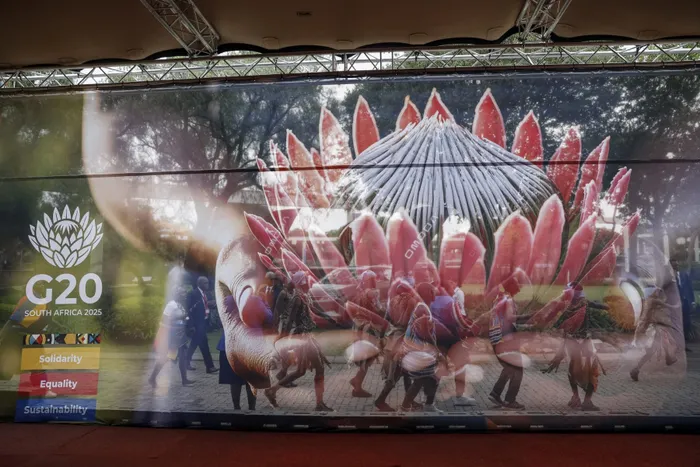
The G20 summit takes place in Johannesburg in November, the first time the meeting is held in Africa.
Image: Phill Magakoe / AFP
As the 2025 G20 Johannesburg Summit approaches, I am delighted to visit South Africa and engage with institutions of the African Union (AU) to further deepen exchanges and cooperation between China and the AU.
Having worked in Africa for many years, I have developed a deep affection for this “land of hope.” Since taking up my post as Head of the Chinese Mission to the AU, and through increasingly close exchanges with the AU and African countries, I have come to deeply appreciate the continent’s enduring pursuit of fairness, justice, and its aspiration for development and prosperity.
On September 1st, President Xi Jinping formally proposed the Global Governance Initiative (GGI) at the “Shanghai Cooperation Organization Plus” Meeting. This marks another significant global public good China has contributed to the world, following the Global Development Initiative (GDI), the Global Security Initiative (GSI), and the Global Civilization Initiative (GCI).
The GGI addresses a defining issue of our time: “What kind of global governance system do we need, and how can we reform and improve it?” Its core principles closely align with the G20 Presidency theme advocated by South Africa—Solidarity, Equality, and Sustainability—and echo the development goals of Agenda 2063.
The GGI responds to the call of the times. 2025 marks the 80th anniversary of the victory of the World Anti-Fascist War and the founding of the United Nations. The AU’s theme of 2025 is “Justice for Africans and People of African Descent through Reparations.” Across Africa and the wider international community, calls to address historical injustices are growing stronger, and the demand for a fairer, more equitable global order has never been more urgent.
Yet, the current international situation is complex and volatile. Today’s global governance system is facing three key challenges: under-representation of the Global South, waning authority of existing institutions, and an urgent need for improved effectiveness. We are at a critical juncture—like rowing upstream, we must advance or risk falling behind. President Xi Jinping’s proposal of the GGI is a timely and visionary response to today’s global challenges. It reflects the momentum of history and the shared aspirations of people around the world.
The GGI addresses real challenges. As two leading forces in the Global South, China and Africa share a strong consensus on safeguarding the UN-centred international system, advancing multipolarity, and promoting the democratisation of international relations. Reforming global governance does not mean dismantling the existing international order or building parallel systems. Rather, the goal is to enhance the capacity and effectiveness of existing institutions.
The GGI’s five core concepts—being committed to sovereign equality, international rule of law, multilateralism, a people-centred approach, and real results—are in line with the purposes and principles of the UN Charter, aiming to uphold the authority of the UN, reinforcing its central role in global affairs, and encouraging all nations to participate in shaping a more inclusive and effective global governance framework through the UN and other multilateral platforms.
The GGI demonstrates the responsibility of a major country. China has long played an active role in advancing world peace, development, and stability, while steadfastly supporting the international order. We advocate for greater representation and voice for developing countries in global decision-making and support efforts to strengthen the Global South, which remains a weak link in current global governance structures. We will continue working to strengthen South-South cooperation and foster synergy among developing countries to ensure the global governance system better reflects the will and interests of the majority of countries, especially those from the developing world.
Guided by the principles of extensive consultation and joint contribution for shared benefits, the GGI embodies China’s firm commitment to multilateralism. As the first country to openly support the AU’s accession to the G20, China strongly backs South Africa’s leadership as this year’s G20 Presidency. We remain committed to supporting Africa’s increased voice on the global stage, addressing historical injustices, and improving Africa’s representation in international governance.
We deeply appreciate the AU Commission’s appreciation and strong support for the GGI. With the G20 Summit to be held on African soil for the very first time in just one month, I sincerely wish South Africa a highly successful presidency. May it bring new energy from the Global South into global governance and leave a powerful “African imprint.”
Looking ahead, we are eager to take the GGI as a guiding framework and work hand in hand with the AU, African and all developing countries to build a more just, equitable, and inclusive international order. Together, we can open a brighter future—one of peace, security, prosperity, and progress for all.
* Ambassador Jiang Feng, Head of Mission of China to the AU and Representative of China to the UNECA
** The views expressed do not necessarily reflect the views of IOL or Independent Media.
Related Topics: